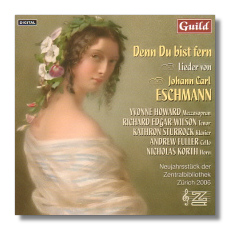
The Internet's Premier Classical Music Source
Related Links
- Latest Reviews
- More Reviews
-
By Composer
-
Collections
DVD & Blu-ray
Books
Concert Reviews
Articles/Interviews
Software
Audio
Search Amazon
Recommended Links
Site News
 CD Review
CD Review
Carl Eschmann

Denn Du bist fern
- Zwei Gedichte von Pauline E., Op. 2
- Fünf Lieder von J. von Eichendorff, E. Geibel und W. Müller, Op. 7
- Zwei Heimgekehrte – Gedicht von Anastasius Grün, Op. 10
- Zwiegesang – Gedicht von R. Reinick, Op. 11
- An Louise von C. Gedichte von August Corrodi, Op. 32
- Sechs Gedichte von August Corrodi, Op. 34
- Vier Gesänge für eine mittlere Stimme, Op. 48
- Fünf Gesänge "In stiller Nacht", Op. 49
Yvonne Howard, mezzo-soprano
Richard E. Wilson, tenor
Kathryn Sturrock, piano
Andrew Fuller, cello
Nicholas Korth, horn
Guild GMCD7295 79m DDD
The Swiss composer, Johann Karl Eschmann, born in 1826 is a rather obscure name in the annals of European music, but this CD is the ideal opportunity to assess his output from the proper perspective. He was introduced to music at an early age by his father and his first lessons were with the renowned pianist Alexander Muller, one of Wagner's friends.
From 1845, Eschmann studied for two years at the Leipzig Conservatory with such eminent names as Mendelssohn and Moscheles. On his return to Switzerland in 1847 he made a name for himself as an excellent teacher and musician. Three years later he moved to Winterthur, his birthplace, where he worked for many years. In 1859 he moved to Schaffhausen working as a piano and singing teacher and founding a mixed choir, apart from conducting the men's choir from 1862 on.
In 1866 he settled in Zürich where he met Brahms. The latter's interest helped Eschmann in his compositions and he was successfully recommended to Simrock, Brahms' publisher in Berlin. The composer died in 1882 aged 56. His reputation rests mainly on his piano and song output and this disc covers an almost complete compilation of Eschmann's songs composed between 1850 and 1870.
The early pieces are mostly dominated by the vocal line, mainly a soprano or a tenor, mostly dominated by the vocal line, mainly a soprano or a tenor, but in the later works the piano is raised to the level of an equal partner to the voice. Only in two instances does a further instrument join in; the horn in Op. 10 and the cello in Op. 11. Both soloists and instrumentalists give their all in an effort to bring out all the beauties of those little gems conceived in the best romantic tradition. A fine collection of songs lovingly performed and certainly deserving closer attention than they have so far commanded.
Copyright © 2006, Gerald Fenech




















